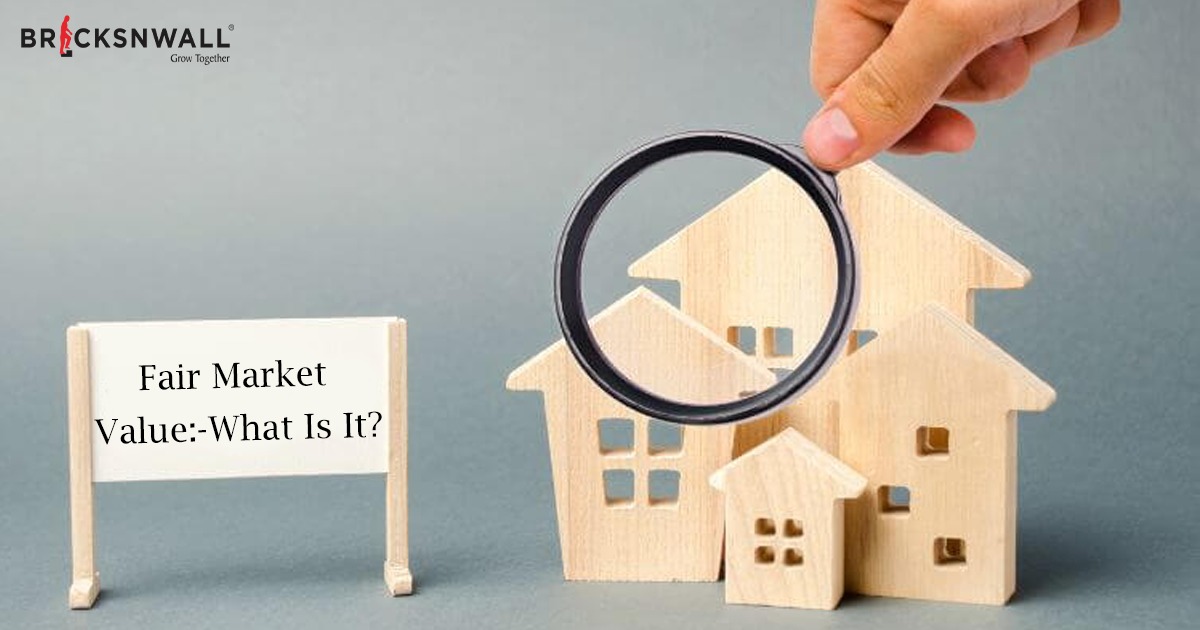Fair Market Value: What Is It?
Bricksnwall Trusted Experts

Assuming that both the buyer and the seller are
looking for the best deal, fair market value is the amount that an asset would
sell for in the present market. The phrase is frequently used in legal
contexts, when determining an objective value for some assets can be
challenging.
Market value, or the amount an asset would fetch on
the open market in the present, is comparable to fair market value (FMV).
Nevertheless, the following extra presumptions apply to fair market value:
Both the buyer and the seller have a fair understanding of the asset, and they are acting in their own best interests.
There is no excessive pressure on either party, and
they are both given a fair amount of time to finish the deal.
In light of these circumstances, the fair market
value of an asset ought to be a precise appraisal of its value relative to its
current price. The value of an asset may be higher or lower than its market
value depending on these assumptions. In the fields of accounting, taxation,
bankruptcy, divorce, and real estate, this definition of the term is widely
used.
Important Takeaways
- The amount an asset would get on the open
market under specific circumstances is known as its fair market value.
- The requirements include that the parties are
acting in their own best interests, are fully informed of all the facts,
are not under any duress to buy or sell, and have enough time to decide.
- Market value and evaluated value are not the
same as fair market value.
- Fair market value is frequently used in the
real estate market and in tax situations.
- When deciding how much to pay out on a claim, insurance firms consider fair market value.
Knowing what Fair Market Value (FMV) is
Because it takes into account the economic
principles of free and open market activity, fair market value is purposefully
different from phrases like market value or evaluated value. On the other hand,
the price of an asset in the marketplace is referred to as its market value.
Consequently, it is easier to ascertain a home's
market value from a listing than its fair market value.
Similarly, the word "appraised value"
does not instantly qualify the assessment as fair market value because it
relates to the value of an asset as determined by a single appraiser.
However, an assessment will typically be adequate
when a fair market value is required.
Fair market value is frequently employed in legal
contexts since it is determined after careful examination. For instance, the
fair market value of real estate is frequently used to determine compensation
for the government's exercise of eminent domain and in divorce settlements.
In taxation, fair market values are also frequently used, for example, in figuring out a property's fair market value for a tax deduction following a casualty loss.
Uses of Fair Market Value in Practice
The FMV of the owner's property is frequently used
to calculate municipal property taxes.
The gap between the purchase price and the home's FMV might be significant, depending on how long the owner has owned the property. To ascertain a home's FMV, qualified appraisers consult national and local laws, rules, and recommendations.
The insurance sector also frequently uses FMV. For instance, when an insurance claim is filed because of an automobile accident, the insurance provider typically pays for damages up to the vehicle's fair market value.
Taxation and Fair Market Value
For tax reasons at least, tax authorities almost always make sure that transactions are consummated at FMV. For instance, a father who is retiring might sell his daughter shares of the company for $1, allowing her to continue running the family firm.
But let's say the shares' FMV is higher. In that scenario, the transaction may be recharacterized for tax purposes by tax authorities like the Internal Revenue Service (IRS). As if he had sold the shares to a third party at FMV, the father will be responsible for paying taxes on the disposition.
Giving property, like artwork, to charities is
another area of taxation where FMV is frequently relevant. In these situations,
a tax credit for the donation's value is typically given to the donor. Tax
authorities frequently request independent appraisals for donations from donors
in order to verify that the credit is for the object's true FMV.
Applying fair market value to taxes correctly guarantees that there won't be any negative financial effects down the road or any accusations of fraud from the authorities.
How Is Fair Market Value Determined?
There are several approaches to evaluate rather than determine fair market value. First, by the item's cost to the seller, as determined by an expert's opinion or a list of sales for comparable items. Based on their skill, a diamond appraiser, for instance, would probably be able to recognize and calculate a diamond ring.
How Can I Determine My Home's Fair Market Value?
Professional appraisers evaluate real estate properties and use national and local legislation, standards, and guidelines to estimate the property's fair market value.
In a divorce, how are assets valued?
The laws governing the allocation of marital assets vary by state. Current market prices are usually used to determine the worth of liquid assets like stocks and bonds. Vehicles, electronics, and home goods are all priced at their fair market value, which is usually less than what they cost when they were first purchased. Businesses, jewels, artwork, real estate, and professional degrees are more difficult to value and may need expert testimony or evaluation to establish a reasonable price.
The Bottom Line
Based on a number of assumptions, fair market value is an estimate of the potential sale price of an item. Since market value is the asset's current price, this valuation approach is different from market value. Because fair market value is thought to be a more accurate picture of value, corporations and governments adopt it instead of market value, even though market value may be less or more than it.
- Assuming that both the buyer and the seller are looking for the best deal, fair market value is the amount that an asset would sell for in the present market.
- The price at which an item is purchased or sold, provided the buyer and seller voluntarily agree on the price, is the assets fair value.
- According to the Peter Lynch fair value formula, a stocks trailing P/E ratio (price/EPS) will match its long-term EPS growth rate when it is fairly valued: EPS * EPS Growth Rate equals Fair Value







